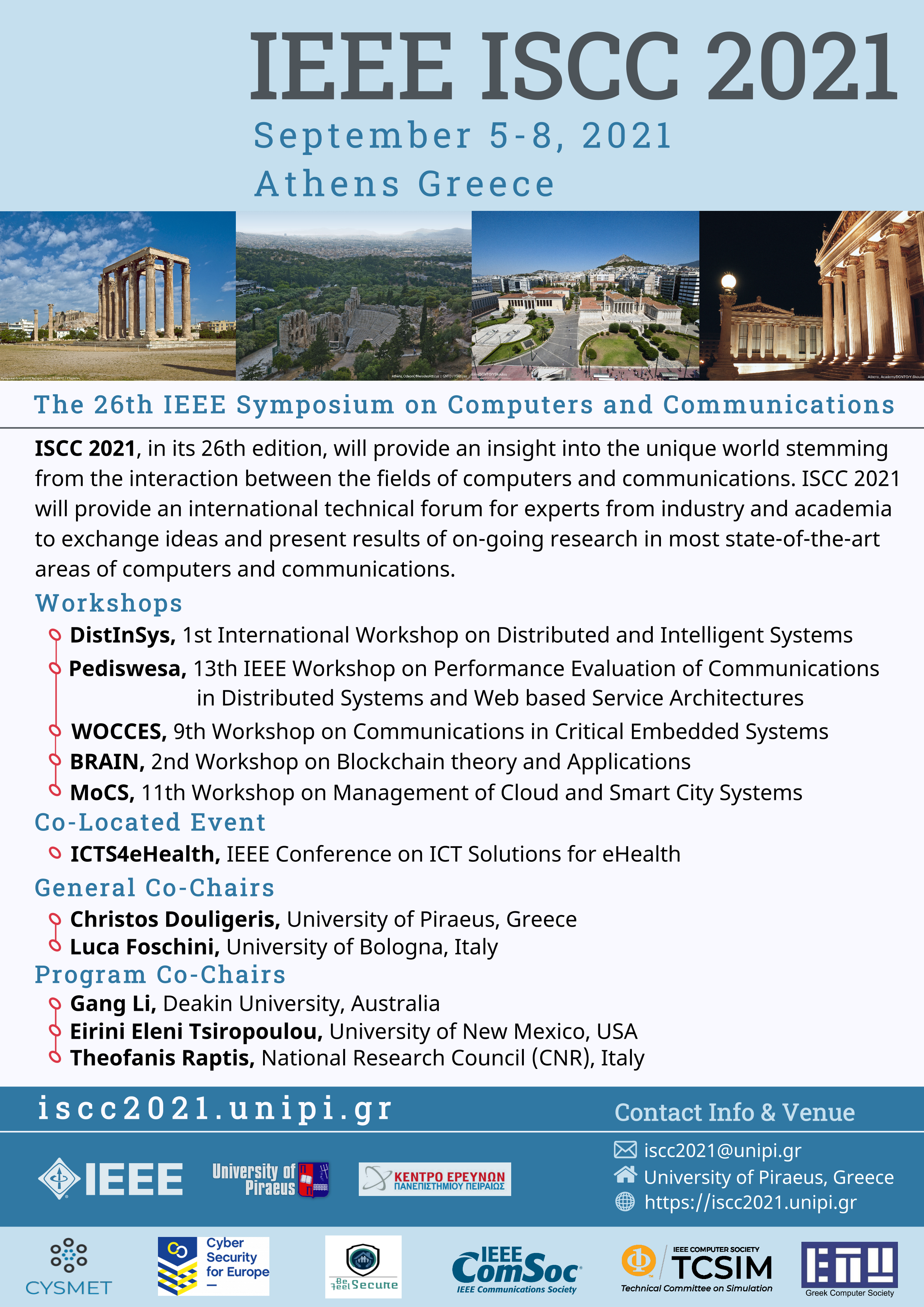You are invited to submit a full paper, a proposal for a Panel/Invited Session or a Tutorial, related to the following topics of interest:
-
5th Generation Networks (5G)
▪ Resource Allocation
▪ Network Slicing
▪ Topology Management
▪ 5G Core Network and Service Based Architecture
▪ C-RAN and backhaul
▪ SDN and NFV for 5G
▪ Network Stability, Control and Optimization
▪ Standardization Activities by IEEE, 3GPP and ETSI
-
Artificial Intelligence (AI)
Artificial Intelligent Systems applications in Computers and Communications ▪
Game Theory ▪
Machine Learning ▪
Bio-inspired Computing in Communications ▪
Data Science and Data Engineering ▪
Distributed Knowledge and Processing ▪
Trusted AI ▪
-
Cloud and Edge Computing
▪ Cloud Computing (IaaS, PaaS, and SaaS)
▪ Mobile Cloud and Mobile Cloud Networking
▪ Fog Computing
▪ Distributed Systems Architecture and Management
-
Internet of Things (IoT)
LPWAN (LoRa, Sigfox, NB-IoT, LTE-M, Wi-SUN) ▪
6TiSCH, 6LoWPAN, Roll ▪
Rest API, CoAP, CBOR, OSCORE ▪
Smart Spaces ▪
Cyber Physical Systems ▪
Telecare Medical Information System ▪
-
Optical Networks
▪ Optical Network Protocols and Architectures
▪ Energy-efficient/green Optical Communications and Networks
▪ Visible Light Communications (Indoor, Outdoor and Localization)
▪ Optical Wireless Communication Applications for Future Networks
-
Vehicular Networks
Intelligent Transport Systems (ITS) ▪
IEEE 802.11p ITS-G5 ▪
Millimeter Waves ▪
V2X, V2I, V2N, V2V, V2P, V2D, V2G ▪
Inter and intra vehicle communication and protocols ▪
-
Wireless Networks
▪ Cognitive Radio Networking
▪ Wireless, Cellular, and Mobile Communications
▪ Modeling and Simulation
▪ Signal Processing for Communications
-
Services and Protocols
Advances in Internet Protocols ▪
Green Networking ▪
Real Time Communication Services ▪
Routing and Multicast ▪
Network Design, Optimization and Management ▪
Network Reliability, Quality of Service and Quality of Experience ▪
Fault-Tolerance and Error Recovery ▪
Web Services and Service Oriented Architectures ▪
Standards Evolution ▪
Digital Satellite Communications Service ▪
Localization Protocols ▪
Communications Services and Management ▪
Crowdsourcing applications ▪
Peer-to-Peer Computing ▪
-
Software Defined
▪ Software Defined Networks and Network Function Virtualization
▪ Software Defined Smart Objects
▪ Software Defined Data Centers
▪ Software Defined Radio
▪ Overlay and Programmable Networks
-
Security and Privacy
Data Privacy ▪
Attacks and Defenses ▪
Authentication, Authorization and Accounting ▪
Hardware Security ▪
Intrusion Detection ▪
Moving Target Defense (MTD) ▪
Blockchain ▪
-
Application domain / Framework / Architecture
▪ e-Health and Bioinformatics
▪ Smart Grid
▪ Smart City
▪ Industry 4.0
▪ Smart Building
